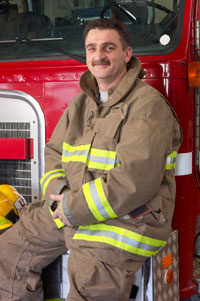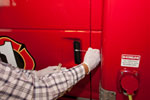MRSA Exposure and Firefighters

In the last ten years, the number of hospital- and community-acquired methicillin-resistant Staphylococcus aureus (MRSA) infections—those often contracted in schools, public gyms, and in workplaces--has risen. Because MRSA can be transmitted from surfaces to people and from person to person, the increase in incidence has led to concern for first responders, including police, firefighters and emergency medical personnel. Fire personnel interact with both hospital and community populations as part of their job and have the potential to be exposed to MRSA as part of their daily duties.
Washington Fire Chiefs Partner with UW To Protect Firefighters From MRSA
The Washington Fire Chiefs are partnering with the University of Washington (UW) Department of Environmental and Occupational Health and UW Field Research and Consultation Group in Seattle to better understand the presence and distribution of MRSA in fire stations and to help reduce risk factors. They will provide a number of MRSA environmental sampling kits to fire stations across the state as part of the UW Environmental Sampling for MRSA in Fire Stations Project.
The UW Environmental Sampling for MRSA in Fire Stations Project is open to fire stations across Washington state.

How can a fire station participate in the project?
- Request a sampling kit from the UW Field Research and Consultation Group
- Complete a short survey
- Collect 20 swab samples from different locations within the fire station
- Mail the samples back to UW Field Group in a pre-paid box
If you have questions about participating in the project, please contact Nancy Simcox at the UW Field Research and Consultation Group at 206-543-9711.
The University of Washington has put together educational materials and resources for fire stations including topics such as MRSA in the workplace, Best practices on Cleaning and Infection Control, and Training opportunities. The latest scientific studies related to MRSA in fire stations are also available.
MRSA Fact Sheets
Prevent MRSA: Maintain a "Clean Zone" in the Fire Station
UW Study influences Disinfection Protocols
Professor Marilyn Roberts and her team looked at MRSA contamination in fire stations and determined which locations were most likely to be contaminated. The study was conducted to improve decontamination of the station and truck environmental surfaces and to use the information to develop and distribute educational materials on best practices for disinfection protocols. A story on the study and its impact on disinfection protocols was published in the department's Environmental Health News.
PowerPoint Presentation: Methicillin Resistant Staphylococcus aureus MRSA and Fire Departments (33.5 MB)
News
King 5 News: Next phase of MRSA study rolled out to Washington's firefighters
King 5 News: UW study reveals MRSA bacteria in local fire stations
MRSA exposure for firefighters, medics greater than for general public: UW study